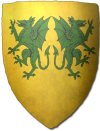The Kingdom of Logres

| Country | |
|
| |
| Information | |
|---|---|
| Continent: | Britain |
| Country: | [[Category:{{{Country}}}]] |
| Culture: | {{{Culture}}}Property "Culture" (as page type) with input value "{{{Culture}}}" contains invalid characters or is incomplete and therefore can cause unexpected results during a query or annotation process. |
| Ruler: | None |
| Heir apparent: | None |
| Military power: | |
| Political power: | |
| Attitude: | |
| Coat-of-Arms | |
| Or, two dragons addorsed rampant vert | |

| |
Property "Name" (as page type) with input value "{{#replace:Logres||_}}" contains invalid characters or is incomplete and therefore can cause unexpected results during a query or annotation process.
Information
Logres is the kingdom of lowland Britain, encompassing about half of the total area of the island and most of the prime land for farming. It is divided into 25-28 counties, depending upon the time period. The realm was named after the legendary king Locrinus, the oldest son of Brutus of Troy.
It is mostly home to the Cymric culture, and is in the early stages of feudalism.
Geography
Political
In the current year of [[Timeline]], much of Uther's Logres has been chipped away by Saxons, Cornwall and infighting.
From the west, Cornwall has taken Tintagel, Ascalon and is continuing his march into the former western parts of Logres.
In the south and east the Saxons of several tribes are taking their opportunity with the lack of British king and are invading several of the border counties. Up north the northern king stems some of the Saxon tide but the northern counties are still having a hard time.
Main article, Map of Britain
Rulers
- First ruler - Locrinus
- 390 - 440: King Constantine the Just
- 440 - 444: King Constans the Child-king
- 444 - 463: King Vortigern the Usurper
- 463 - 466: Interregnum (Hengist)
- 466 - 480: High King Aurelius, the Last Roman
- 480 - 495: King Uther, the King of Warlords
- 495 - present: _Interregnum_
History
The kingdom is old. Though the leadership of the ancient tribes lost their dominant political power to Rome, the people clung to their customary ways. The Romans left most tribal traditions and boundaries intact, as long as the peasants paid into the imperial system. When the imperial presence failed, Roman Britain continued briefly before collapsing as the people flocked to the warlords who actually protected them. Each ruler has changed things just a little, adapting ideals intoreality to form the kingdom. Now the kingdom’s Ancient Laws and Customs still hold sway, overlaid with the old Roman tax system, and adapted to support a militarized society run by warlords.
The old land of Logres is said to be named after Locrinus, first amongst the sons of Brutus himself. When Brutus died, the land was split amongst his son, his oldest son took the land he called Logres, the largest and most fertile land.
When the Romans came they conquered all of the lowlands, and when they departed the local tribes were left in command again. Throughout much of the island the local lords became independent kings, but here they continued to cooperate and maintain some unity. The eastern regions, once ruled by Saxons, reverted to their pagan beliefs.
Territories
= Dukedom
Several decades ago King Aurelius Ambrosius divided Logres into defense zones each with a dux militum (L. “leader of soldiers”) charged with fast local defense against raiders. Each duke can call local barons of the dukedom to form an army to repel invaders, but the barons are not his vassals. Thus, a dukedom is a military administrative unit, not a civil one. There were six dukedoms in Uther's time, but in anarchy the title means little.
Counties and Areas
- Bedegraine
- Berroc
- Caerwent
- Clarence
- Dorsette
- Glevum
- Hartland
- Huntland, Homage to Est Seaxe
- Jagent
- Lambor
- Linden
- Lonazep
- Gentian
- Rydychan
- Salisbury
- Silchester, in alliance with Suth Seaxe
- Thamesmouth
- Tribruit
- Wuerensis
Former Counties
- Tintagel (now part of Cornwall)
- Ascalon (now part of Cornwall, Ascalon is also known as Devon)
- Summerland (now independent)
- Cantiacii (renamed Kent)
- Regnensis (renamed Suth Seaxe)
- Hantonne (renamed West Seaxe)
- Caercolun (renamed Est Seaxe)